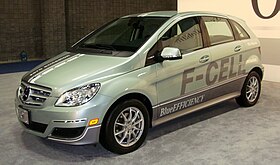Mercedes-Benz F-Cell
This article needs to be updated. (June 2020) |
| Daimler AG F-Cell | |
|---|---|
 | |
| Overview | |
| Manufacturer | Daimler AG |
| Body and chassis | |
| Class | Fuel Cell |
| Dimensions | |
| Length | 3,840 mm (151.2 in) |
| Width | 1,764 mm (69.4 in) |
| Height | 1,593 mm (62.7 in) |
The F-Cell is a hydrogen fuel cell electric vehicle developed by Daimler AG. Two different versions are known - the previous version was based on the Mercedes-Benz A-Class, and the new model is based on the Mercedes-Benz B-Class. The first generation F-Cell was introduced in 2002, and had a range of 100 mi (161 km), with a top speed of 82 mph (132 km/h). The current B-Class F-CELL has a more powerful electric engine rated at 100 kW (134 hp), and a range of about 250 mi (402 km). This improvement in range is due in part to the B-Class's greater space for holding tanks of compressed hydrogen, higher storage pressure, as well as fuel cell technology advances. Both cars have made use of a "sandwich" design concept, aimed at maximizing room for both passengers and the propulsion components. The fuel cell is a proton exchange membrane fuel cell (PEMFC), designed by the Automotive Fuel Cell Cooperation (AFCC) Corporation.
There are 60 F-Cell vehicles leased to customers in the USA, Europe, Singapore and Japan.
Production
In December 2010, began its B-Class based F-Cell lease program with the first delivery to Vince Van Patten, with a further 69 to be on the roads in California by 2010.[1]
Hydrogen storage
The 350 Bar (5000 PSI) hydrogen tanks for hydrogen storage contain enough fuel for a 248 mi (399 km) drive.[2] Using 700 Bar (10000 PSI) tanks the range is extended 70% to 421 mi (678 km).[3]
Notable publicity
- On May 23, 2006, Daimler announced that its fuel cell vehicle fleets had achieved a combined mileage of over 2 million kilometers (1.24 million miles).[4]
- On May 31, 2006, Daimler revealed that select individuals in California would be able to take their driving examination in an F-Cell.[5]
- On July 6, 2006, Daimler leased 1 F-Cell to DHL Japan as delivery car in Tokyo area.
- On January 30, 2011, three F-Cell vehicles start on a 125-day long-lasting journey around the world.[6]
- On June 21, 2011, Daimler announced it was moving up commercialization of the B-Class F-CELL to 2014 [7]
- On Jan 31, 2014 YouTube video uploaded of new F-cell fuel cell, no information known otherwise.[8]
Recognition
The Mercedes-Benz B-Class F-Cell was selected by Green Car Journal as one of the five finalists to the 2012 Green Car Vision Award.[9][10]
Gallery
-
Original A-Class based F-Cell.
-
Original A-Class based F-Cell.
-
B-Class based F-Cell exhibited at the 2010 Washington Auto Show.
See also
References
- ^ "US: Mercedes B-Class F-Cell now available in California". Automotive World. Retrieved 2010-12-19.
- ^ "Concept BlueZERO". Autobloggreen.com. Retrieved 2010-12-19.
- ^ "Daimler is increasing the pressure: extended operating range for fuel cell vehicles | Daimler Global Media Site > Technology > Fuel Cells". Media.daimler.com. 2008-07-04. Retrieved 2010-12-19.[permanent dead link]
- ^ Blanco, Sebastian (2006-05-30). "DaimlerChrysler fuel cell fleet passes two million kilometer mark". Autobloggreen.com. Retrieved 2010-12-19.
- ^ "California Residents Use Fuel Cell-Powered Mercedes To Get Their Driver's License". Emercedesbenz.com. 2006-05-31. Archived from the original on 2010-08-02. Retrieved 2010-12-19.
- ^ "Mercedes-Benz F-CELL World Drive in Europe: Legs 1-5". Emercedesbenz.com. 2011-02-14. Retrieved 2011-05-24.
- ^ Lienert, Anita (2011-06-21). "Mercedes-Benz Fuel-Cell Car Ready for Market in 2014". Insideline.com. Retrieved 2012-04-25.
- ^ [1]
- ^ Danny King (2012-01-13). "Tesla Model S, BMW i3 among 2012 Green Car Vision finalists". Autoblog Green. Retrieved 2012-01-13.
- ^ Sebastian Blkanco (2012-01-26). "Ford C-Max Energi wins 2012 Green Car Vision Award". Autoblog Green. Retrieved 2012-01-26.
External links
- Road test on USAtoday.com
- News on the German Chancellor taking delivery of an F-Cell
- Driving Impression by Tom Bird of Channel4 - Website is now defunct, so this link uses the Wayback Machine
- "Wayne State Police Department to operate world's first police fuel cell powered vehicle"
- UCLA-Driving the F-Cell



